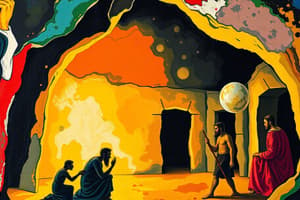Podcast
Questions and Answers
According to Socrates, the quality of one's life is determined by which aspect of a person?
According to Socrates, the quality of one's life is determined by which aspect of a person?
- Body
- Reputation
- Soul (correct)
- Social status
In Plato's philosophy, what is considered as the true self?
In Plato's philosophy, what is considered as the true self?
- Reputation
- Soul (correct)
- Social status
- Body
Plato suggested that to have pure knowledge, one must contemplate things how?
Plato suggested that to have pure knowledge, one must contemplate things how?
- By avoiding contemplation
- With body and soul together
- With the soul alone (correct)
- With the body alone
What did Plato consider the body to be in relation to the true self?
What did Plato consider the body to be in relation to the true self?
How did Plato describe the soul's existence in relation to bodily death?
How did Plato describe the soul's existence in relation to bodily death?
What is considered as a 'prison' for the soul according to Plato's philosophy?
What is considered as a 'prison' for the soul according to Plato's philosophy?
What does Socrates consider the soul to be?
What does Socrates consider the soul to be?
What is emphasized as the essence of the human person by Socrates?
What is emphasized as the essence of the human person by Socrates?
What does Socrates consider to be the ultimate goal of philosophy?
What does Socrates consider to be the ultimate goal of philosophy?
How does Socrates suggest the good life can be attained?
How does Socrates suggest the good life can be attained?
What does Socrates urge individuals to take care of?
What does Socrates urge individuals to take care of?
What is paramount according to Socrates in the pursuit of the good life?
What is paramount according to Socrates in the pursuit of the good life?
What does the allegory of the chariot in Plato's Phaedrus represent?
What does the allegory of the chariot in Plato's Phaedrus represent?
What is the role of the immortal horse in the allegory of the chariot?
What is the role of the immortal horse in the allegory of the chariot?
Why is it essential for the rational soul to control the spiritual and appetitive soul?
Why is it essential for the rational soul to control the spiritual and appetitive soul?
What is St. Augustine's perspective on the self as discussed in the text?
What is St. Augustine's perspective on the self as discussed in the text?
In Plato's allegory, what represents the destination for the chariot guided by the rational soul?
In Plato's allegory, what represents the destination for the chariot guided by the rational soul?
Based on Plato's allegory of the chariot, what happens when the charioteer harmonizes the mortal and immortal horses?
Based on Plato's allegory of the chariot, what happens when the charioteer harmonizes the mortal and immortal horses?
Flashcards are hidden until you start studying
Study Notes
Socrates' Philosophy of the Self
- According to Socrates, "knowing what is right is doing what is right" and the true self is the virtuous self, which is achieved through knowledge, wisdom, and virtue.
- The state of the soul determines the quality of one's life, and it is not about material possessions.
- The soul is the true self, which is the permanent, unchanging self, and it is not identified with one's social status, reputation, or body.
Plato's Philosophy of the Self
- For Plato, the soul is the true self, and it is the permanent, unchanging self, found in the world of Ideas.
- The body is a mere replica of the true self, and it is changing, making it a prison of the soul.
- The soul existed before bodily death and will survive after the body dies, and to free ourselves, we need to contemplate.
- The soul is the seat of knowledge, ignorance, goodness, and badness, and it is the essence of the human person.
The Concept of the Self
- The self is our inner being, and it constitutes our personality.
- To attain the good life, which is the ultimate goal of Socrates' philosophy, we need to take care of our soul.
- The good life is attained through the acquisition of knowledge, wisdom, and virtue.
The Allegory of the Chariot
- The allegory of the chariot, developed by Plato, describes the rational soul as the charioteer, driving two horses (mortal and immortal) towards the realm of the gods.
- The mortal horse represents desires, pleasures, and physical satisfactions, while the immortal horse represents honor, modesty, and temperance.
- The rational soul must control the spiritual and appetitive soul to achieve a well-balanced personality.
St. Augustine's Philosophy
- St. Augustine questions the importance of human beings in the grand scheme of the universe, asking "What is a man, that Thou art mindful of him?"
Studying That Suits You
Use AI to generate personalized quizzes and flashcards to suit your learning preferences.




